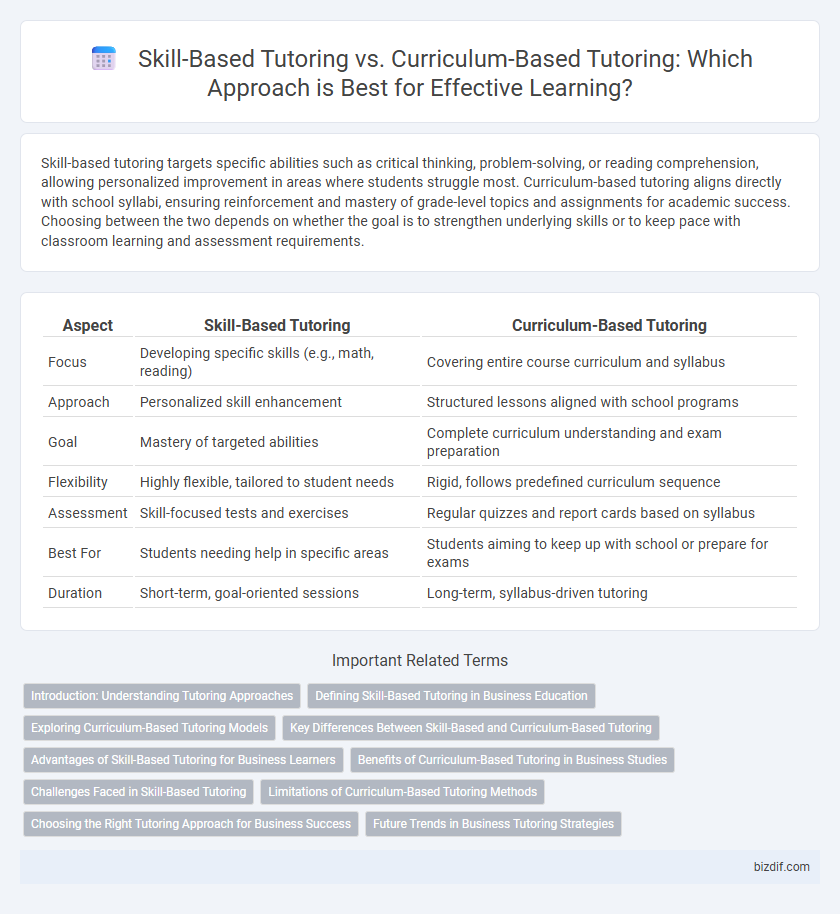Skill-based tutoring targets specific abilities such as critical thinking, problem-solving, or reading comprehension, allowing personalized improvement in areas where students struggle most. Curriculum-based tutoring aligns directly with school syllabi, ensuring reinforcement and mastery of grade-level topics and assignments for academic success. Choosing between the two depends on whether the goal is to strengthen underlying skills or to keep pace with classroom learning and assessment requirements.
Table of Comparison
| Aspect | Skill-Based Tutoring | Curriculum-Based Tutoring |
|---|---|---|
| Focus | Developing specific skills (e.g., math, reading) | Covering entire course curriculum and syllabus |
| Approach | Personalized skill enhancement | Structured lessons aligned with school programs |
| Goal | Mastery of targeted abilities | Complete curriculum understanding and exam preparation |
| Flexibility | Highly flexible, tailored to student needs | Rigid, follows predefined curriculum sequence |
| Assessment | Skill-focused tests and exercises | Regular quizzes and report cards based on syllabus |
| Best For | Students needing help in specific areas | Students aiming to keep up with school or prepare for exams |
| Duration | Short-term, goal-oriented sessions | Long-term, syllabus-driven tutoring |
Introduction: Understanding Tutoring Approaches
Skill-based tutoring targets the development of specific abilities such as reading comprehension, math problem-solving, or writing skills, tailoring sessions to individual learner needs and pacing. Curriculum-based tutoring aligns directly with school curricula, reinforcing classroom instruction through structured lesson plans and homework support designed to improve overall academic performance. Choosing between these approaches depends on whether the goal is to address particular skill deficits or to enhance understanding and achievement within a standardized educational framework.
Defining Skill-Based Tutoring in Business Education
Skill-based tutoring in business education targets the development of specific competencies such as critical thinking, financial analysis, and effective communication, essential for real-world applications. This approach emphasizes hands-on learning through practical exercises tailored to enhance students' abilities in problem-solving and decision-making within business contexts. Unlike curriculum-based tutoring, which follows a predefined syllabus, skill-based tutoring adapts to the learner's pace, focusing on mastering core skills for immediate professional relevance.
Exploring Curriculum-Based Tutoring Models
Curriculum-based tutoring models align instruction closely with school curricula, ensuring students master specific academic standards and content. These models utilize structured lesson plans and assessments tied directly to classroom objectives, promoting consistency and measurable progress. Emphasizing curriculum integration supports targeted skill development within the context of students' ongoing educational pathways.
Key Differences Between Skill-Based and Curriculum-Based Tutoring
Skill-based tutoring zeroes in on developing specific abilities like critical thinking, problem-solving, or reading comprehension tailored to the learner's individual needs. Curriculum-based tutoring follows a structured syllabus aligned with school standards, aiming to reinforce and supplement classroom instruction in subjects such as math, science, or language arts. The key differences lie in customization, focus, and objectives: skill-based tutoring enhances competencies across subjects, while curriculum-based tutoring targets mastery of predetermined academic content.
Advantages of Skill-Based Tutoring for Business Learners
Skill-based tutoring enhances business learners' practical abilities by focusing on critical competencies such as problem-solving, communication, and leadership, which directly impact workplace performance. This targeted approach allows learners to quickly apply new skills in real-world business scenarios, improving job effectiveness and career advancement opportunities. Emphasizing skill mastery over theoretical knowledge leads to increased learner engagement and measurable outcomes aligned with industry demands.
Benefits of Curriculum-Based Tutoring in Business Studies
Curriculum-based tutoring in Business Studies ensures alignment with academic standards and exam requirements, promoting a structured learning path that covers essential concepts like marketing, finance, and management comprehensively. This approach enhances student performance in standardized tests and qualified certifications by focusing on curriculum-specific knowledge and skills. Tailored feedback and targeted content delivery support deeper understanding and practical application, preparing students effectively for both academic success and industry demands.
Challenges Faced in Skill-Based Tutoring
Skill-based tutoring faces challenges such as accurately identifying individual students' specific skill gaps and tailoring instruction to diverse learning paces and styles. Tutors struggle with designing flexible lesson plans that adapt in real-time to evolving skill levels while maintaining student engagement. Limited resources and assessment tools further complicate tracking progress and ensuring mastery of foundational skills.
Limitations of Curriculum-Based Tutoring Methods
Curriculum-based tutoring methods often lack flexibility, failing to address individual students' unique learning paces and styles. These limitations can hinder personalized skill development, as they prioritize content completion over mastery of critical thinking and problem-solving abilities. Consequently, students may struggle to apply knowledge effectively beyond standardized assessments.
Choosing the Right Tutoring Approach for Business Success
Skill-based tutoring targets specific competencies such as critical thinking, problem-solving, and communication that directly enhance employee performance and adaptability in a dynamic market. Curriculum-based tutoring follows a structured syllabus aligned with industry standards, ensuring comprehensive knowledge acquisition and consistent skill development across teams. Selecting the right approach depends on business goals: skill-based tutoring accelerates targeted growth, while curriculum-based tutoring fosters foundational expertise and long-term workforce proficiency.
Future Trends in Business Tutoring Strategies
Skill-based tutoring emphasizes personalized development of specific competencies such as problem-solving, communication, and critical thinking, aligning closely with evolving job market demands. Curriculum-based tutoring remains structured around standardized educational content but is increasingly integrating adaptive technologies to customize learning paths. Emerging business tutoring strategies prioritize hybrid models that combine skill mastery with curriculum goals, leveraging AI-driven analytics to optimize learner outcomes and future employability.
Skill-based tutoring vs curriculum-based tutoring Infographic

 bizdif.com
bizdif.com